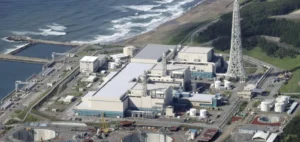Germany will keep two nuclear power plants on standby until the spring of 2023, an about-face deemed necessary to deal with potential energy shortages.
Olaf Scholz’s government, which includes environmentalists, is thus going back on the definitive closure of the last three German power plants, scheduled for the end of 2022, according to the timetable for phasing out nuclear power decided by Angela Merkel after the Fukushima disaster.
“It is certainly very unlikely that the electricity system will experience crisis situations for a few hours during the winter, but this cannot be totally excluded at the moment,” justified the ecologist Minister of Economy, Robert Habeck, quoted in a statement from the ministry.
Two power plants in the south of the country, Isar 2 (near Munich) and Neckarwestheim 2 (Baden-Württemberg, southwest), will remain on standby to deal with any energy emergency.
“At high risk”
New fuel elements “will not be loaded and by mid-April 2023, it will also be over for the emergency reserve,” he assured.
“Nuclear energy is and remains a high-risk technology and the highly radioactive waste weighs on dozens of generations to come,” the minister stressed.
The green vice-chancellor was one of the most reluctant to extend the deadline, which was urged by their liberal allies in the coalition government.
For Mr. Habeck, “an overall life extension would not be defensible, even in view of the safety status of nuclear power plants. “You can’t play with nuclear power.”
He mentioned a “series of uncertain factors” to justify this choice, which is likely to ruffle the feathers of the Greens, historical opponents of nuclear power.
In addition to restrictions on Russian gas supplies, Habeck cited the fact that about half of France’s nuclear power plants were shut down and the drought, which weakens the output of hydroelectric plants in neighboring countries.
This decision is the result of a stress test conducted by the four German electricity network operators, 50Herz Transmission, Amprion, TenneT TSO and TransnetBW.
At the beginning of August, Chancellor Olaf Scholz had prepared the ground for a population traditionally unfavorable to nuclear power: It “may still make sense” not to cut off the country’s last power plants from the grid, he had said.
“Waves”
A first test in March concluded that the three nuclear power plants still operating in Germany were not necessary to ensure the energy security of Europe’s largest economy. These currently produce 6% of the net electricity production in Germany.
“This is a debate that traditionally makes waves in Germany, that arouses a lot of emotions,” Habeck admitted to the press about this bone of contention for the coalition.
Faced with the threat of an energy shortage this winter, the German government has already decided to increase the use of coal, a particularly polluting energy.
Last week, Russian gas giant Gazprom announced that its Nord Stream pipeline linking Russia to northern Germany, which was due to resume service on Saturday after maintenance, would finally be “completely” shut down until a turbine on the vital pipeline is repaired to supply Europe.
On Sunday, Chancellor Scholz sought to reassure that Germany “will be able to cope with this winter” and ensure its energy supply despite the drying up of Russian gas supplies on which its economy is heavily dependent, he said.
But he also stressed that changes at the European level in the electricity market were necessary.
As in other EU countries, rising prices are fuelling public concern and calls for demonstrations, mainly from the far right and far left, are worrying the government.
Since the beginning of the Russian invasion of Ukraine at the end of February, the government of Olaf Scholz has released massive aid for purchasing power.
Germany is not the only country re-evaluating its position on nuclear power after the Russian invasion of Ukraine. At the end of August, Japanese Prime Minister Fumio Kishida announced that a study would be launched on the possible construction of “new generation nuclear reactors with new safety mechanisms”.






















